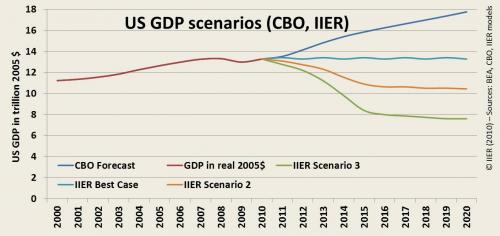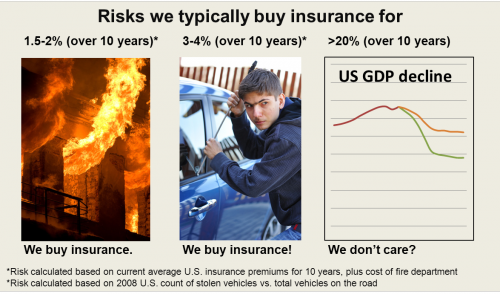One of the most surprising things we encounter these days is that no country, no established economic research institute, and no international organization (such as the IMF) publicly discusses scenarios that don't plan for a return to stable economic (GDP) growth. Even Greece's government, after 2012, expects growth, which would allow the country to slowly reduce its staggering debt. Equally, the U.S. government forecasts annual average (real) growth rates of 4.4% for the years 2012-2014, and 2.4% thereafter until 2020. And so it continues, no matter where we look.
 Fig 1: Official and
alternative scenarios for U.S. GDP growthWhat we find most intriguing, but equally most worrying, is that in all the economic projections we have seen lately, decline or zero growth aren't even mentioned as a faint possibility. We can only speculate why that is the case, but we see significant evidence that only limited effort - if any - is put into understanding the possible consequences and required mitigation strategies. We are highly alarmed about the fact that so few people seem to be ready to think the not-so-unthinkable.
Fig 1: Official and
alternative scenarios for U.S. GDP growthWhat we find most intriguing, but equally most worrying, is that in all the economic projections we have seen lately, decline or zero growth aren't even mentioned as a faint possibility. We can only speculate why that is the case, but we see significant evidence that only limited effort - if any - is put into understanding the possible consequences and required mitigation strategies. We are highly alarmed about the fact that so few people seem to be ready to think the not-so-unthinkable.
"No further" growth or decline are a real possibility
Given the constraints in natural resources, our currently unprecedented levels of debt on a global scale, and the absence of ideas for that next grand "leap forward" for mankind, it seems plausible to us that we might have to say goodbye to economic  Fig 2. We have no insurance for no-growth scenariosgrowth, and not just for a year or two, but for long, maybe forever. IIER's models say that chances for steady economic growth after 2010 are below 10-20%, but even if you disagree with that low a number and put the probability for "more growth" to, say, 80%, we consider it quite irresponsible to not at least consider the other 20%. Not buying insurance for a risk that might hit you with a one in five chance seems quite foolish to us.
Fig 2. We have no insurance for no-growth scenariosgrowth, and not just for a year or two, but for long, maybe forever. IIER's models say that chances for steady economic growth after 2010 are below 10-20%, but even if you disagree with that low a number and put the probability for "more growth" to, say, 80%, we consider it quite irresponsible to not at least consider the other 20%. Not buying insurance for a risk that might hit you with a one in five chance seems quite foolish to us.
Consequences of "no growth" are quite unpleasant
Our current world is about as prepared for "no growth" as is a fish to walk on land. All our current claims systems, the credit outstanding, including government debt, our pension expectations, our savings, our hopes and dreams, are mostly focused on "more tomorrow". Should this "more" disappear as a possibility, we will likely not just see small implications, but rather a disruptive destruction of perceived wealth and security, accompanied by the shattering of hopes and dreams, which might cause further trouble in our highly complex societies. But the worst will happen if we run into such a world completely unprepared.
This is why we urgently need policymakers to face the risk of "no-growth", to understand possible implications and to work on mitigation approaches.
Why not use upcoming elections to ask a few questions?
So with elections coming up in a number of places, particularly for mid-term in the United States in fall 2010, why not ask a few innocent questions to those people who want our vote? Why not at least instill some concern and caution into the candidates who wish to represent us in the future? Why not have them ask themselves how they would deal with a situation where they can no longer promise "more", but instead have to think about how to make "less" more appealing to everyone...
This is why we have - after some animated discussions - drafted a letter to an imaginary politician who wants to get elected in 2010 or 2011. We see no reason why this kind of letter shouldn't be sent to real people who want our vote. If you agree, please feel free to use the template below for your own questions to whomever wants your help in getting (re)elected.
Dear candidate - have you ever... ?
Dear ______________
You are currently running for office as _____________________ in ____________________. As you know, we are living through economically tough times, and I hear a lot about how the economy can be brought back to stability and prosperity.
However, have you ever considered that economic growth might actually not return? That we might have to settle for less?
If so, what would be your plans to mitigate such a situation, to make sure that life can go on for your constituents in a future where "more each year" is no longer possible?
Or alternatively, if you don't have any plans - are you 100 percent certain that growth and prosperity will ever return, and if so, why is it that you see no risk worth looking at?
I would truly appreciate an honest answer to my question, as I am personally very worried about the risk of "no more growth" in the foreseeable future, but even more concerned about the absence of us making any plans for such a possibility.
Reader Comments
Add new comment